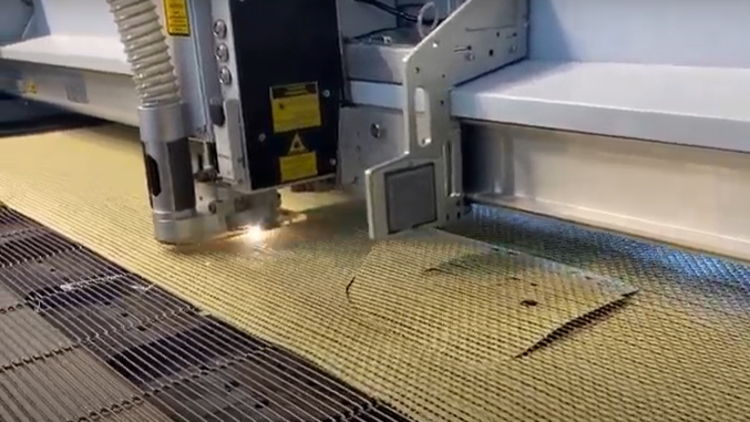Delcotex is specialised in the production of all kinds of technical textiles. With almost 300 years of textile experience, Delcotex has focused on the production of prepregs for the automotive and other transport sectors in recent years. When its composite materials have to be cut, Delcotex recommends laser cutting systems from the Lüneburg-based company eurolaser.
Compared to conventional materials, thermoplastic prepregs can save a lot of weight and costs while optimising the stability of components. However, the high degree of stability of the fabric has also a disadvantage: conventional knives or punches are becoming dull very quickly during usage. Consequently, this results in the recommendation from Delcotex to cut materials with laser cutters from eurolaser. ‘Laser cutting gets ahead where other tools fail‘, says Mr Thomas Armbruster, Head of Marketing and Product Management at eurolaser.
The new material DeliComp now enables laser cutting of prepregs
Mr Carl Mrusek, Head of Business Development at Delcotex: ‘Our prepregs are so stable that mechanical cutting with knives or punches does not work. The tools would be dull in a minimum of time. Economical cutting is only possible with a water jet or a laser. We are pleased with the laser cutting systems from eurolaser as water jet cutting brings another hurdle with it. Damp edges have to be dried, which will take up to 24 hours again to dry before our customers can then, continue with the further processing of the prepregs. With the laser, the prepregs can now be cut quickly, precisely and, above all, drily. Besides, there is practically no wear of the laser. ‘
Good for the environment: save weight with Delcotex and eurolaser
‘Especially in the course of the Fridays for Future movement and the great public interest in climate and environmental protection, weight reductions and the associated savings in fuel consumption and thus, reduced CO2 emissions are more relevant than before,‘ said Mr Thomas Armbruster. ‘The composite materials from Delcotex help automotive manufacturer in particular to save massive amounts of weight in the crucial areas without having to forego the necessary material properties, such as stability and durability.‘ Besides, thermoplastic prepregs, which are largely made of fibreglass and polypropylene, are, compared to their expensive brother carbon, suitable for large-volume series use. Thanks to the contactless, force-free cutting, car manufacturers and especially their suppliers can save time and tool costs as well as the effort involved in assembly. Together, Delcotex and eurolaser not only ensure a better environment for their users with the help of weight savings and process optimisation, but above all, by lower operating and production costs.
Proven tandem: eurolaser and Delcotex
Delcotex recommends eurolaser laser cutting systems to its customers. The industrial laser cutters are not only reliable, they are also durable. ‘In addition to being more economical than mechanical cutting, this also helps to save money in production,‘ says Mr Thomas Armbruster. ‘In return, we at eurolaser regularly test new technical textiles from Delcotex. We issue certificates of which materials can be cut with which of our laser cutting systems. In addition, we also recommend the corresponding cutting speeds of the laser machines to our customers. ‘





